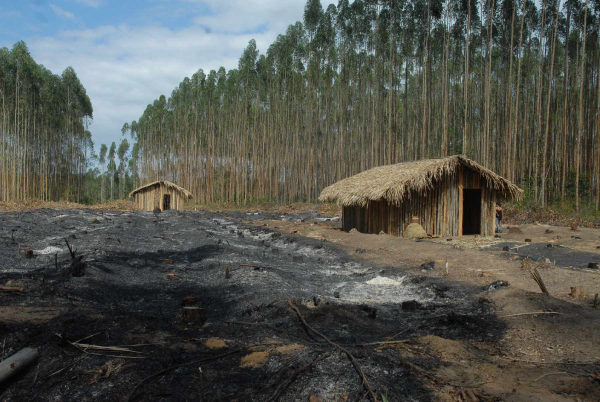- The current ecological crises facing our planet are extensively the result of a human behavioral crisis, according to a 2023 paper appearing in the journal Science Progress. The paper cites economic growth, marketing and pronatalism as key drivers of human “maladaptive behaviors” resulting in ecological overshoot.
- The authors, three of whom have affiliations with the marketing industry, argue that behavior manipulation through the use of marketing could go a long way toward solving our environmental problems. Marketing “may just be our best chance at avoiding ecological catastrophe,” they write.
- Experts interviewed by Mongabay say they agree that human behavior contributes to the environmental problems faced today, but they disagree with the paper’s focus on behavior manipulation of individuals as a leading solution, which risks shifting focus from the urgent need for broader systemic changes, such as decarbonization.
- “The most effective and scalable behavior change interventions often target social, physical and economic factors rather than individuals directly,” notes behavioral scientist Kristian Steensen Nielsen.
A paper generated by the Merz Institute, an Aotearoa New Zealand-based think tank, and published in the journal Science Progress in 2023, hypothesizes that the environmental crises our planet faces today are the direct result of “the Human Behavioural Crisis” — with ecological overshoot driven by economic growth, marketing and pronatalism (the social and institutional pressures to have children).

Humanity’s maladaptive behavior, unless changed, the authors maintain, is so ingrained that it could result in the failure of major environmental solutions as proposed today, including “resource-intensive interventions” such as a global transition to renewable energy, which the paper concludes isn’t just a “narrow intervention” but “likely to make matters worse.”
Lead author Joseph Merz, founder & chairman of the Merz Institute, and his co-authors propose that marketing, which they count as one of the three major drivers of ecological overshoot (when humanity’s demands exceed ecosystems’ regenerative capacity), should be harnessed as a key environmental solution. “Paradoxically, the marketing, media and entertainment industries complicit in the creation and exacerbation of the behavioural crisis, may just be our best chance at avoiding ecological catastrophe,” they write.
“I don’t think we have much time at all … to make the necessary behaviorial changes [via] … understanding and education,” Merz explained on the Planet: Critical podcast. Merz instead urges using consumer psychology, data analytics and other persuasive tools employed by the marketing, advertising and communication industries, “to create the levels of change we need” quickly with the public.
Among its recommendations, the paper offers a “call for an emergency, concerted, multidisciplinary effort to target the populations and value levers most likely to produce rapid global adoption of new consumption, reproduction and waste norms congruent with the survival of complex life on Earth.”

Human behavior as both problem and solution
The Science Progress “article raises important points about the environmental and climate challenges humanity faces and their behavioral roots,” notes Kristian Steensen Nielsen, a behavioral scientist and assistant professor at Copenhagen Business School, who was not involved in the research.
But Nielsen doesn’t fully concur with its findings, which he says he views as overly simplistic. “These challenges are not new, and I found the article mostly disjointed and too insensitive to the incredible complexity that underlies the discussed dynamics and social scientific insights.”
David Hall, a senior lecturer with a background in climate policy at New Zealand’s Auckland University of Technology, who was not involved in the research, adds that while experts may agree that marketing has been a driver of the environmental crisis, they also come to very different conclusions regarding its role as a solution. For example, well-known degrowth advocate Jason Hickel says “we actually need less marketing,” Hall notes. “Marketing is something which needs to degrow along with other industries.”
Merz emphasizes the inherently interdisciplinary approach taken by his investigative team in an email he sent to Sage Journals, the article’s publisher, which Sage sent to Mongabay. “The paper doesn’t limit itself to marketing and is certainly not saying marketing on its own will suffice [as a solution],” Merz says. “It is about naming and framing the behavioral crisis and the importance of anchoring in behavior when looking to address ecological overshoot. It’s a place to start exploring the multitude of maladaptive behavioral drivers (marketing being just one) and how they might be turned in a direction that is better suited to a species in the advanced stages of ecological overshoot.”
“A major point of the paper is that having identified the role of marketing in promoting hyper-consumption and hence overshoot, those same mechanisms might provide means for adapting behaviour in the reverse direction of consuming less,” writes co-author Chris Rhodes in the same email provided to Mongabay.
Concern over a perceived conflict of interest
The paper, “World scientists’ warning: The behavioural crisis driving ecological overshoot,” has raised concerns with some in the climate space who think there could be a conflict of interest, though lead author Merz says there is none.
The perceived conflict arises due to the elevation of marketing as a key ecological solution in a paper where three co-authors hold executive positions in global marketing firms. They include Rory Sutherland (vice chair at Ogilvy), Dane Smith (a regional consulting partner at Ogilvy Australia) and Mat Maroni (chief strategy officer for the Asia-Pacific branch of UM, Universal McCann Worldwide, Inc.). Also, co-author Maroni’s employment with UM is not named in the paper.
Ogilvy is a long-established global marketing, advertising and public relations agency, while UM is an international media and advertising agency. Both firms were called out for having contracts with fossil fuel companies during Climate Week in New York in September, 2023, by the Clean Creatives environmental activist group.

Ogilvy & Mather (now known as Ogilvy) is particularly well known for its 2005 marketing campaign utilizing the personal carbon footprint concept to rebrand fossil fuel giant BP, British Petroleum. BP remains a client of Ogilvy in Australia/New Zealand as of this writing.
“That connection just struck me,” says Hall. “The critiques of the ‘Beyond Petroleum’ campaign resonate very strongly to the current paper, [especially how that] campaign shifted responsibility onto individual consumers … put[ting] the blame on them rather than acknowledging the role that BP played in creating dependencies on its products, and also the role BP played in obscuring scientific information about climate change.”
Sage Journals, the paper’s publisher, in an email sent to Mongabay wrote that “We do not find any conflict of interests with the paper, nor did the two external reviewers of the paper.” Science Progress, the journal in which the paper appears, requires authors to disclose “all relationships and activities that might bias or be seen to bias their work,” according to the journal editors’ committee recommendations, which they ask authors to review.
“I certainly didn’t see this as a conflict (and still don’t),” wrote lead author Merz in an email provided to Mongabay by Sage. “Ogilvy is not only a PR firm, they are an advertising giant. … Rory Sutherland (who is one of the co-authors and the vice-chairman of Ogilvy) is an extremely prominent figure in the marketing world, particularly in the field of behavioural science. … I thought it made a lot of sense to invite Rory (and Dane) on as co-authors.”

Behavioral crisis and systemic problems
While individual behavior interventions (as influenced by marketing) can play a role in resolving the environmental crises, they aren’t the most effective approach, Nielsen says. And such interventions don’t remove the need to deal with systemic problems — the real political and physical barriers that individuals face, such as access to alternative transportation, human rights, gender equity, education and health care. All of that requires structural government reform, he points out.
“Behavior is embedded within complex social, cultural, economic, institutional and physical systems. This means prevailing barriers and incentive structures sometimes prevent behavioral changes, even among the highly motivated,” Nielsen concludes.
A recent study in Science Advances tested 11 different behavioral interventions in 63 countries with 59,440 participants and found that “the interventions’ effectiveness was small,” and “largely limited to nonclimate skeptics.”

The Merz Institute paper is silent regarding any need to regulate the fossil fuel industry, though it strongly condemns the energy transition now underway. The origins of that judgment may possibly be found in the thinking of paper co-author William Rees. Rees co-created the “ecological footprint” concept in the 1990s, which was later co-opted by Ogilvy for BP. He was quoted on the Overpopulation Podcast saying, “The only thing worse than the failure of the energy transition would be the success of the energy transition.”
That’s a view with which the paper authors concur: “Even if successful — which is not likely — the energy transition would address only a single symptom of ecological overshoot, likely worsening other symptoms significantly in the process,” they write.
Hall and many Intergovernmental Panel on Climate Change scientists view things quite differently. “Rees, in particular, seems to think of the energy transition [providing] just … one possibility [for change], but there’s no reason why we couldn’t also pursue demand reduction in addition to substitution of technologies.”

The Merz Institute paper omits the need for legislative interventions to curb ecological overshoot, Hall notes. Proposed solutions such as the fossil fuel nonproliferation treaty could “address the problem of carbon dioxide emissions at the source by arguing that we should come up with global agreements to reduce the supply of oil, gas and coal into the economy.” A similar framework model for this legislation already exists in the Montreal Protocol, which successfully rolled back the global threat of an industrially weakened ozone layer.
This isn’t to say marketing and “behavior manipulation” can’t play a role in the solution, Hall and Nielsen agree. “Sure, social marketing, i.e., marketing [that promotes] positive environmental and social solutions, can contribute to promoting environmentally significant behavioral changes, but there are notable limits to its population-wide effectiveness,” says Nielsen.
Banner image: While India has the highest population of any country in the world, its per capita carbon emissions rank 110th globally. The United States ranks 13th, meaning the average person in the U.S. emits 13.88 tons of CO2 annually, while the average person in India emits only 1.78 tons of CO2. Dealing with such vast inequities requires complex social, political, economic and technological solutions. Image by eddypellegrino via Pixabay (Public domain).
Citations:
Merz, J. J., Barnard, P., Rees, W. E., Smith, D., Maroni, M., Rhodes, C. J., … Sutherland, R. (2023). World scientists’ warning: The behavioural crisis driving ecological overshoot. Science Progress, 106(3). doi:10.1177/00368504231201372
Hampton, S., & Whitmarsh, L. (2023). Choices for climate action: A review of the multiple roles individuals play. One Earth, 6(9), 1157-1172. doi:10.1016/j.oneear.2023.08.006
Sinding, S. W. (2009). Population, poverty and economic development. Philosophical Transactions of the Royal Society B: Biological Sciences, 364(1532), 3023–3030. doi:10.1098/rstb.2009.0145
Vlasceanu, M., Doell, K. C., Bak-Coleman, J. B., & Van Bavel, J. J. (2023). Addressing climate change with behavioral science: A global intervention tournament in 63 countries. doi:10.31234/osf.io/cr5at




You must be logged in to post a comment.